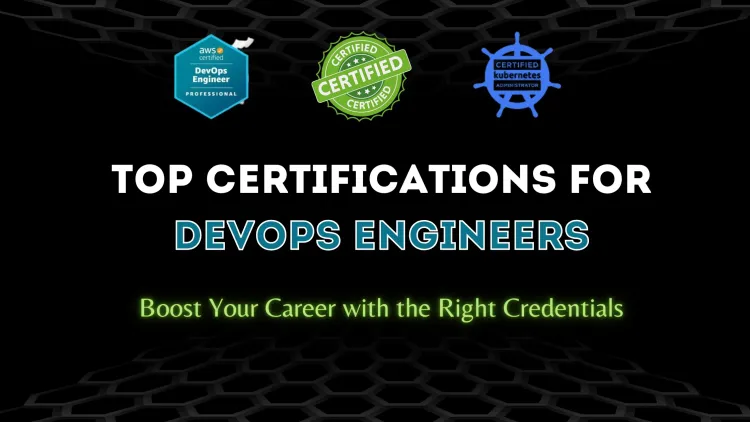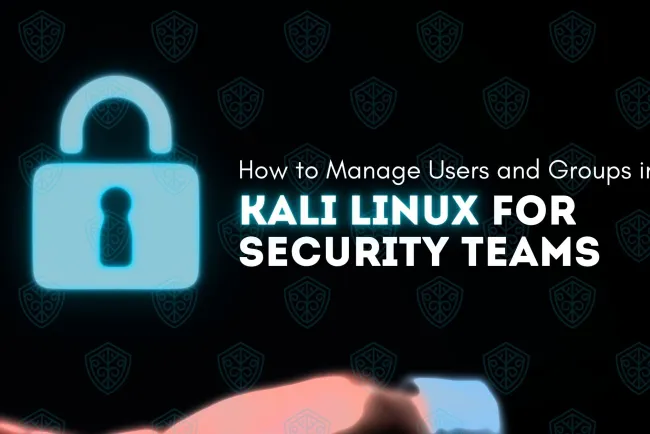Top Certifications to Boost Your Career as a DevOps Engineer | A Comprehensive Guide
The demand for DevOps Engineers is on the rise, and certifications have become a key differentiator in this competitive field. This blog explores the top certifications for DevOps professionals, including options like AWS Certified DevOps Engineer, Google Professional Cloud DevOps Engineer, and Certified Kubernetes Administrator (CKA). It provides insights into the skills covered by each certification, their relevance in the industry, and how they can help you achieve your career goals. The blog also includes a table to help beginners and experienced professionals choose the right certification based on their career aspirations. By investing in certifications, you can validate your expertise, enhance your employability, and stay ahead in the dynamic world of DevOps.

The demand for DevOps Engineers continues to grow as organizations adopt DevOps practices to improve collaboration, automate processes, and deliver software more efficiently. However, breaking into the DevOps field requires not just skills and experience but also industry-recognized certifications that validate your expertise. Certifications demonstrate your ability to implement DevOps principles, work with cutting-edge tools, and optimize workflows.
In this blog, we’ll explore the best certifications for aspiring DevOps Engineers, how they can boost your career, and the skills they cover.
Why Certifications Matter in DevOps
DevOps is a multidisciplinary field combining software development, IT operations, and automation. Certifications help you:
- Prove your expertise in specific tools like Kubernetes, Docker, and Jenkins.
- Build a strong foundation in DevOps methodologies.
- Gain an edge in a competitive job market.
- Access higher-paying job opportunities.
- Stay updated with the latest practices and tools.
Top Certifications for DevOps Engineers
Here’s a list of industry-recognized certifications to help you stand out:
1. AWS Certified DevOps Engineer – Professional
- Best For: Experienced professionals working with AWS cloud.
- What It Covers:
- Automation of testing and deployment.
- Managing continuous delivery systems and monitoring applications on AWS.
- Security and compliance best practices.
- Why It’s Valuable: AWS dominates the cloud market, and this certification shows expertise in AWS-specific DevOps tools and services.
2. Microsoft Certified: DevOps Engineer Expert
- Best For: Professionals working with Microsoft Azure.
- What It Covers:
- Designing and implementing DevOps strategies.
- Infrastructure as Code (IaC) using tools like Terraform or ARM templates.
- Continuous integration and delivery (CI/CD).
- Why It’s Valuable: It validates your skills in leveraging Azure DevOps tools for development and operations.
3. Google Professional Cloud DevOps Engineer
- Best For: DevOps Engineers working on Google Cloud Platform (GCP).
- What It Covers:
- CI/CD pipeline implementation.
- Monitoring and improving system performance.
- Incident management.
- Why It’s Valuable: GCP is growing rapidly, and this certification validates your knowledge of DevOps processes specific to Google Cloud.
4. Docker Certified Associate (DCA)
- Best For: Beginners seeking expertise in containerization.
- What It Covers:
- Docker fundamentals, such as creating, managing, and deploying containers.
- Orchestrating services in Docker Swarm.
- Best practices for using Docker in production environments.
- Why It’s Valuable: Containers are the backbone of modern DevOps workflows, and Docker is a leading tool in this domain.
5. Certified Kubernetes Administrator (CKA)
- Best For: Professionals focusing on Kubernetes orchestration.
- What It Covers:
- Cluster setup, management, and troubleshooting.
- Application deployment on Kubernetes.
- Networking and security within Kubernetes clusters.
- Why It’s Valuable: Kubernetes is widely used for container orchestration, making this certification essential for DevOps professionals.
6. Jenkins Engineer Certification
- Best For: Those specializing in continuous integration and delivery pipelines.
- What It Covers:
- Jenkins installation, configuration, and management.
- Pipeline scripting for automation.
- Scaling and securing Jenkins servers.
- Why It’s Valuable: Jenkins is one of the most widely used CI/CD tools, and this certification validates expertise in streamlining development workflows.
7. HashiCorp Certified: Terraform Associate
- Best For: DevOps Engineers focusing on Infrastructure as Code (IaC).
- What It Covers:
- Writing and validating Terraform configuration files.
- Managing infrastructure using Terraform workflows.
- Best practices for scaling infrastructure.
- Why It’s Valuable: Terraform is the go-to IaC tool, and this certification validates your ability to automate infrastructure.
8. Red Hat Certified Specialist in Ansible Automation
- Best For: Automation enthusiasts.
- What It Covers:
- Writing Ansible playbooks.
- Managing system configurations.
- Automating repetitive IT tasks.
- Why It’s Valuable: Ansible is a key tool for configuration management, and this certification proves your automation expertise.
9. DevOps Institute Certifications
- Certifications Available:
- DevOps Foundation
- SRE (Site Reliability Engineering) Foundation
- Continuous Delivery Ecosystem Foundation
- Best For: Professionals looking to learn DevOps methodologies and practices.
- Why It’s Valuable: These vendor-neutral certifications focus on the cultural and process aspects of DevOps.
How to Choose the Right Certification
With so many options, selecting the best certification depends on your career goals and experience level.
| Career Goal | Recommended Certification |
|---|---|
| Entry-level DevOps role | Docker Certified Associate, DevOps Foundation |
| Cloud-based DevOps expertise | AWS Certified DevOps Engineer, GCP Professional Cloud DevOps Engineer |
| Focus on automation | Red Hat Specialist in Ansible, Terraform Associate |
| Specializing in container orchestration | Certified Kubernetes Administrator |
| Advanced CI/CD pipeline expertise | Jenkins Engineer Certification |
Benefits of Getting Certified
- Career Growth: Certifications enhance your resume and open doors to higher-paying roles.
- Increased Confidence: Certification training equips you with the skills needed to succeed in interviews and on the job.
- Networking Opportunities: Many certification programs connect you with industry peers and mentors.
- Stay Relevant: Continuous learning helps you adapt to evolving technologies and practices.
Conclusion
Earning a certification in DevOps is an excellent way to demonstrate your expertise, gain recognition, and boost your career prospects. Whether you're just starting out or looking to specialize in areas like cloud computing or automation, certifications provide a structured path to success.
With the right certification, dedication, and practical experience, you’ll be well on your way to becoming a successful DevOps Engineer in this dynamic field.
FAQs
-
Why are certifications important for a DevOps Engineer?
Certifications validate your skills in DevOps tools and methodologies, making you stand out to potential employers. -
Which certification is best for beginners in DevOps?
The Docker Certified Associate (DCA) and DevOps Foundation certifications are ideal for beginners. -
What is the AWS Certified DevOps Engineer certification?
This certification focuses on automation, deployment, and monitoring of applications on AWS. -
Is Kubernetes certification necessary for a DevOps Engineer?
Yes, Kubernetes is widely used for container orchestration, and the Certified Kubernetes Administrator (CKA) certification is highly valued. -
What does the Microsoft Certified: DevOps Engineer Expert certification cover?
It covers Azure DevOps tools, CI/CD pipelines, and infrastructure automation. -
How does the Terraform Associate certification benefit DevOps Engineers?
It validates your skills in Infrastructure as Code (IaC), a critical aspect of DevOps workflows. -
What are some free resources to prepare for DevOps certifications?
Platforms like Udemy, Cybrary, and LinkedIn Learning offer affordable or free courses to help you prepare. -
Can I get certified without prior DevOps experience?
Yes, beginner-level certifications like Docker Certified Associate and DevOps Foundation are designed for newcomers. -
How do certifications impact salary in DevOps?
Certifications can significantly boost your earning potential by demonstrating your expertise to employers. -
What is the best way to prepare for DevOps certification exams?
Study official guides, take practice exams, and gain hands-on experience with relevant tools and platforms.












![Top 10 Ethical Hackers in the World [2025]](https://www.webasha.com/blog/uploads/images/202408/image_100x75_66c2f983c207b.webp)

![[2025] Top 100+ VAPT Interview Questions and Answers](https://www.webasha.com/blog/uploads/images/image_100x75_6512b1e4b64f7.jpg)









